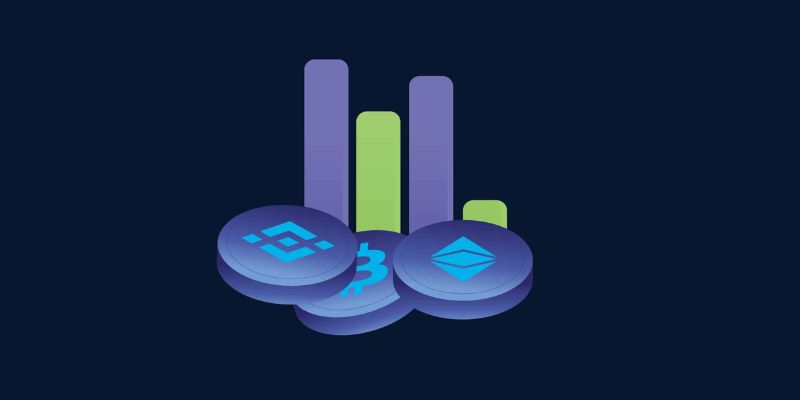Diving into the world of cryptocurrency can feel like decoding an enigma. “What crypto tools do beginners need?” you might ask as you stand on the digital currency doorstep. I got your back! You need a solid starting point, so let’s reveal the must-haves for your first foray into this revolutionary realm. The crypto toolkit I’m about to unfold isn’t just a random collection; it’s the groundwork for all budding crypto enthusiasts. From choosing a shield (yes, I mean a secure wallet) to mastering the maps of trading platforms—it’s all about starting on the right foot. No frills, no fluff, just the essentials to kick-start your journey. Let’s lay down the blocks and cement your path in the cryptosphere.
Understanding the Crypto Landscape: A Primer for Beginners
Cryptocurrency Basics for Novices
Cryptocurrencies are a form of digital money. They live online and are not controlled by any one boss. Visualize digital coins that you can send through the internet. This is the future of money. It’s called cryptocurrency because it uses a very special kind of math to keep your money safe.
Beginner’s Guide to Crypto
Jumping into crypto might seem like walking through a thick forest at night. But don’t worry. There’s a clear path. When you start, there’s lots you need to know. But today, we’re going to talk about just the basics.
The first step in your crypto journey is getting a wallet. Think of this as your online pocket. It holds all your digital money. There are two types: hot wallets and cold wallets. Hot wallets are always connected to the internet. This makes them easy to use but not always the safest. Cold wallets are like a safe. They’re not online all the time, so they’re much harder for bad guys to break into.
Now, you’ll need to know about exchanges. These are like digital markets where you buy or sell digital coins. Some are big and have many types of coins. Others are small and just have a few. Picking one can feel like picking a seat on the bus. You want to get it right because you’ll spend a lot of time there.
So, how do you turn your real money into digital coins? This is called fiat to crypto conversion. You can do this at some ATMs, websites, or even in some stores. But most folks do it on exchanges. It’s like exchanging your dollars for euros when you visit Europe.
Now let’s talk learning. Understanding how this all works is like putting on your armor. You’ll feel brave and safe. There are free guides and videos online that make learning fun and easy. The more you know, the better you’ll do.
Remember: crypto can be like a wild rodeo. Prices jump up and down all the time. That’s why some folks like to use price tracking tools. These help you keep an eye on your digital coins, just like a cowboy watches his herd.
Last but not least, back up your stuff. Imagine if you lost your favorite toy and had no way to find it. That’s how it feels to lose your digital coins. Always have a backup so you won’t be sad if something goes wrong.
We talked about some big ideas today, right? Wallets, exchanges, turning money into digital coins, and keeping track of it all. You’re off to a good start.
Learning crypto is like building with blocks. Start with the basics and you’ll be building skyscrapers soon. Keep going, step by step, and one day you’ll look back and be amazed at how far you’ve come.
Establishing Your Crypto Foundation: Wallets and Exchanges
Secure Crypto Wallets for Newbies
When you start with crypto, think of a wallet as your bank. It holds your money, or in this case, your digital coins. Just like a real wallet, it needs to be secure. So, what’s a reliable wallet for a beginner? Look for wallets that are easy to use and keep your coins safe.
First, choose between a ‘hot’ or ‘cold’ wallet. Hot wallets connect to the internet, like an app on your phone. They’re handy but less secure than cold wallets. Cold wallets are like vaults. They’re not online, so hackers can’t reach them.
One solid pick for newbies is a hardware wallet. It’s like a USB stick that stores your crypto offline. Always remember, you must guard your wallet’s private keys. These keys are like the password to your digital fortune. If you lose them or someone steals them, goodbye coins. So back them up and never share them.
Understanding Crypto Exchanges
Now let’s talk about crypto exchanges. An exchange is like a market where you buy and sell coins. Just like picking a wallet, start with an exchange that’s easy and safe. Watch for ones with a simple layout, helpful support, and good reviews from other users.
Exchanges come in two main types: fiat to crypto, and crypto to crypto. Fiat to crypto exchanges let you use dollars or other money to buy crypto. Crypto to crypto platforms trade between different digital coins.
As a beginner, start with fiat to crypto. This way, you can use money from your bank to get your first bitcoin or ether. Look for exchanges that teach you about the process. They should explain things like setting orders, checking prices, and securely managing your coins.
Remember, fees and security are key. Some exchanges have high fees; always check them before you get started. Make sure your pick uses security stuff like two-factor authentication. It’s an extra step for logging in, but it’s worth it to keep your investment safe.
Lastly, take it slow. There’s no rush. Learn the ropes, start small, and grow your skills and your crypto wallet from there. Always double-check everything, and keep learning every day. That’s how you build a strong crypto foundation.
Mastering Crypto Analysis and Trading Platforms
Essential Crypto Analysis Tools
In crypto, you need the right tools to succeed. Analysis tools guide your choices. They show price trends and patterns. Use them to make informed decisions. Many are simple, even for beginners.
Start with price tracking tools. Check crypto prices in real-time. This helps you know when to buy or sell. CoinMarketCap and CoinGecko are popular choices. They offer prices, charts, and market data.
Understanding fundamental and technical analysis is key. Fundamental analysis looks at a coin’s value. It sees if the coin is worth investing in. Technical analysis studies price movements. It uses charts to predict future prices. Both are important.
Next, there are blockchain explorers. They let you see all transactions on a blockchain. This is crucial for seeing how coins move. Sites like Blockchain.com provide this service. It’s like peering into the heart of crypto.
Finally, portfolio management apps keep you organized. They help track your investments. You can see how well your portfolio is doing. Apps like Blockfolio and Delta are top picks. Organizing your coins can make or break your success.
Cryptocurrency Trading Platforms for Starters
Choosing the right trading platform is a big step. You want one that’s easy to use. It should be secure and trustworthy. Coinbase and Binance are solid for novices. They offer a mix of good security and easy interfaces.
Understanding exchanges is a must. They let you swap fiat (like USD) for crypto. They also let you trade one crypto for another. When picking an exchange, watch for fees and security. High security is crucial.
Now, about setting up a digital wallet. You’ll need this to store your coins. Make sure it’s secure. Look for wallets with good reviews from other users. They should support two-factor authentication too. This adds an extra layer of security.
Cold storage versus hot wallets matter. Cold storage keeps coins offline. It’s safer from hackers. Hot wallets are connected to the internet. They’re easier to use but less secure. Beginners often start with hot wallets.
Backup solutions for cryptocurrency are your safety net. Always back up your wallet. If you lose access to your wallet, backups can save your day. Having a recovery plan is smart.
Remember, security practices in crypto are vital. Choose exchanges and wallets that value security. Use strong passwords and two-factor authentication. Keep your software up to date. Don’t share your private keys.
In summary, your toolkit should have:
- Price tracking tools
- Fundamental and technical analysis understanding
- Blockchain explorer access
- Portfolio management apps
- A simple, secure trading platform
- Two-factor authentication for accounts
- Backup solutions for your digital wallet
Dive in, stay patient, and keep learning. That’s how you master crypto.
Advancing Your Crypto Knowledge and Security
Importance of Private Keys and Security Practices
What’s a private key? It unlocks your crypto wealth. It’s like a secret code. Never share it. Keep it safe, or you risk losing your coins.
Private keys are critical. You must protect them as you would cash. Imagine someone stealing your wallet. It’s that serious. Weak security can lead to theft. Always back up your private keys. Write them down, store them securely, and keep them offline if you can. Also, use two-factor authentication on your accounts. It adds a layer of defense.
What if you lose your key? Sorry, but your crypto is gone for good. To avoid this, use hardware wallets. They are like safes for your keys. Choose trusted brands. Look for ones with good reviews and a strong security track record.
Keeping your private key secure is not hard. It needs your constant attention though. Apply these practices to stay safe. Remember, the responsibility is all yours in the world of crypto.
Educational Resources for Cryptocurrency and Backup Solutions
How do you stay smart with crypto? Learn daily, from reputable sources. Beginners should read, watch, and explore constantly.
Great places to start are online forums like Reddit or crypto education platforms. Always check who wrote the info. Trust experts more than random comments.
Where to find good sources? Look for well-known crypto influencers and educators. They often share their knowledge online. Websites with “.edu” endings are also pretty reliable.
Backup solutions? They’re your safety net. Use them to save a copy of your wallet key. How? Copy your key, store it on a USB drive, and keep it locked away. Or use a paper wallet. Just print your key and store it safely.
For extra safety, use a metal backup. It’s like engraving your key. Metal can survive fires and floods. Your paper backup cannot.
Why backups? They protect against loss. If your computer dies, your backup will save you. Always have a plan B (that’s a backup!).
In summary, get your head into crypto books and articles. Protect your private key fiercely. Make backups and keep learning. It’s a big, exciting world out there. Dive in, but play it safe. It’s your journey into the future of money. Go ahead with confidence.
In this post, we dove into the crypto world, perfect for those just starting out. We covered the basics, helping you understand what crypto is and how it works. Then, we moved on to the nuts and bolts of crypto wallets and exchanges. You now know where to store your crypto and where to trade it.
We also talked about analysis tools and trading platforms. With these, you can make smart moves in the crypto market. Security is key, so we touched on the must-knows like private keys and safe habits. And don’t forget, keep learning! There are many resources to help you grow your crypto smarts. Stay curious, stay safe, and dive deeper into these digital coins. The crypto journey is thrilling, and you’re well on your way!
Q&A :
What Essential Tools Should a Crypto Beginner Consider Using?
Starting out in the world of cryptocurrency can seem daunting, but the right tools can make the experience more accessible and secure. Beginners should consider using a reliable cryptocurrency wallet for storing their assets securely, a reputable exchange platform for buying and selling, and portfolio tracking tools to monitor investments. Additionally, utilizing news aggregators and educational resources can help new users stay informed about market trends and develop a better understanding of the crypto ecosystem.
How Do You Safely Store Cryptocurrencies When Starting Out?
Safe storage of cryptocurrencies is paramount for both beginners and seasoned investors. As a beginner, choosing a trusted digital wallet that provides secure encryption and private keys is crucial. There are two main types of wallets: hardware wallets, which are physical devices that keep your crypto offline, and software wallets, which are programs or apps that can be accessed on various devices. It’s also advised to use wallets that offer two-factor authentication and to keep a backup of your private keys in a secure location.
Is It Necessary for Beginners to Use a Crypto Portfolio Tracker?
Yes, using a crypto portfolio tracker can be incredibly beneficial, especially for beginners who are looking to stay organized and make informed decisions. These tools help you keep track of the performance of your various cryptocurrency investments in real-time, show historical data which can be helpful for identifying trends, and provide insights into the overall health of your portfolio. Portfolio trackers can simplify the process of tax reporting and allow novices to learn from their investing strategies over time.
What Are the Top Tips for Crypto Trading Beginners?
Crypto trading beginners should start by educating themselves on the basics of blockchain and how different cryptocurrencies function. It is also important to invest only what you can afford to lose, diversify your investments, and start small. Beginners should avoid making decisions based on hype and instead learn to analyze market trends and data. Finally, it’s crucial to use secure and reputable exchanges and to stay updated on industry news and regulations, which could affect your investments.
Can You Use Regular Money to Buy Cryptocurrency?
Yes, you can use regular “fiat” money—such as USD, EUR, GBP, etc.—to buy cryptocurrency. This is typically done through cryptocurrency exchanges, which are platforms that facilitate the buying and selling of cryptocurrencies for fiat currencies or other digital assets. Many exchanges allow users to link their bank accounts or use credit and debit cards to make purchases. It’s important to research and choose a reliable exchange that complies with regulations and provides secure transactions.



